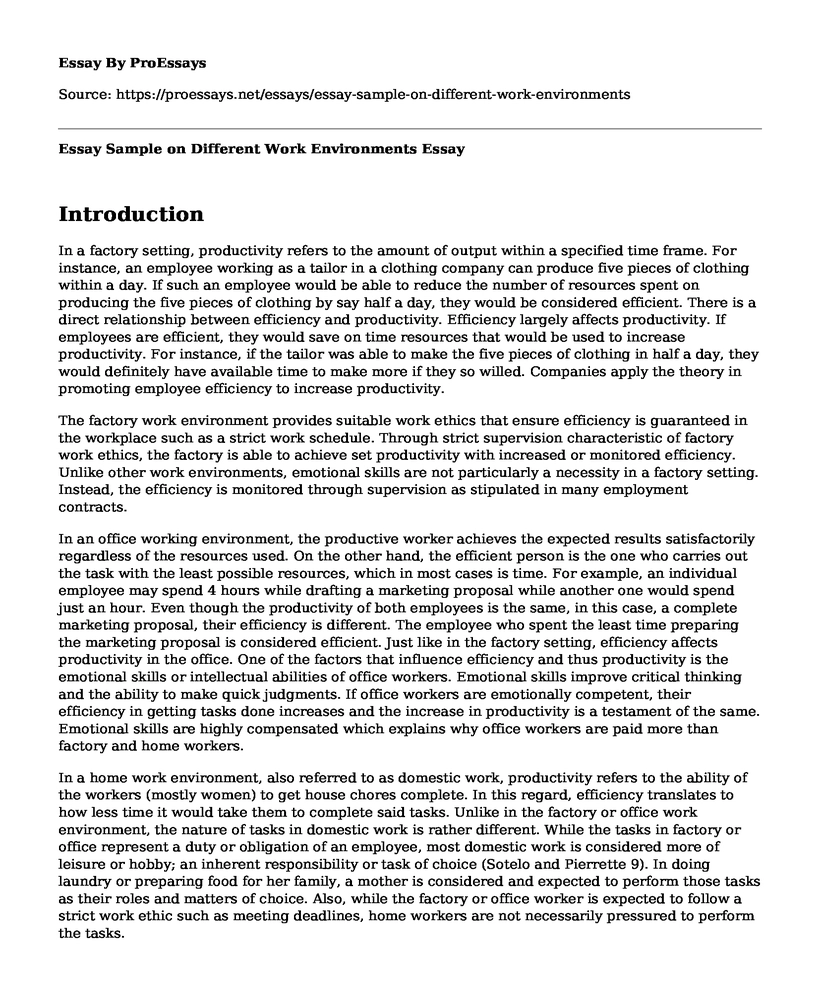Introduction
In a factory setting, productivity refers to the amount of output within a specified time frame. For instance, an employee working as a tailor in a clothing company can produce five pieces of clothing within a day. If such an employee would be able to reduce the number of resources spent on producing the five pieces of clothing by say half a day, they would be considered efficient. There is a direct relationship between efficiency and productivity. Efficiency largely affects productivity. If employees are efficient, they would save on time resources that would be used to increase productivity. For instance, if the tailor was able to make the five pieces of clothing in half a day, they would definitely have available time to make more if they so willed. Companies apply the theory in promoting employee efficiency to increase productivity.
The factory work environment provides suitable work ethics that ensure efficiency is guaranteed in the workplace such as a strict work schedule. Through strict supervision characteristic of factory work ethics, the factory is able to achieve set productivity with increased or monitored efficiency. Unlike other work environments, emotional skills are not particularly a necessity in a factory setting. Instead, the efficiency is monitored through supervision as stipulated in many employment contracts.
In an office working environment, the productive worker achieves the expected results satisfactorily regardless of the resources used. On the other hand, the efficient person is the one who carries out the task with the least possible resources, which in most cases is time. For example, an individual employee may spend 4 hours while drafting a marketing proposal while another one would spend just an hour. Even though the productivity of both employees is the same, in this case, a complete marketing proposal, their efficiency is different. The employee who spent the least time preparing the marketing proposal is considered efficient. Just like in the factory setting, efficiency affects productivity in the office. One of the factors that influence efficiency and thus productivity is the emotional skills or intellectual abilities of office workers. Emotional skills improve critical thinking and the ability to make quick judgments. If office workers are emotionally competent, their efficiency in getting tasks done increases and the increase in productivity is a testament of the same. Emotional skills are highly compensated which explains why office workers are paid more than factory and home workers.
In a home work environment, also referred to as domestic work, productivity refers to the ability of the workers (mostly women) to get house chores complete. In this regard, efficiency translates to how less time it would take them to complete said tasks. Unlike in the factory or office work environment, the nature of tasks in domestic work is rather different. While the tasks in factory or office represent a duty or obligation of an employee, most domestic work is considered more of leisure or hobby; an inherent responsibility or task of choice (Sotelo and Pierrette 9). In doing laundry or preparing food for her family, a mother is considered and expected to perform those tasks as their roles and matters of choice. Also, while the factory or office worker is expected to follow a strict work ethic such as meeting deadlines, home workers are not necessarily pressured to perform the tasks.
There is also the issue of juggling activities while working in a home environment. While the factory or office worker must adhere to a specific guideline to maintain efficiency, the home worker may be handling several tasks simultaneously since time is a non-issue. These differences in the three work environments constitute the grounds for failure to establish an equitable work compensation that ensures fair work compensation. Unlike the factory or office setting, efficiency does not affect productivity. Just like in the factory setting, home tasks such as doing laundry and cooking do not particularly need emotional skills.
Works Cited
Hondagneu-Sotelo, Pierrette. Domestica: Immigrant Workers Cleaning and Caring in the Shadows of Affluence, with a New Preface. Univ of California Press, 2007.
Cite this page
Essay Sample on Different Work Environments. (2022, Dec 04). Retrieved from https://proessays.net/essays/essay-sample-on-different-work-environments
If you are the original author of this essay and no longer wish to have it published on the ProEssays website, please click below to request its removal:
- Paper Sample on Culture and Work
- Cognitive Behavior Therapy in Social Work Essay
- Spokesperson Career Paper Example
- Essay Sample on My Future Career: Police Officer
- Addiction: A Study of Career Counseling in Relation to Holland and Work Adjustment Theories - Essay Sample
- Essay on Theory-Based Risk Management: Conflict, Organizational Behavior & Vulnerability
- Essay on Performance Measurement Systems: Enhancing Decision-Making in Healthcare Organizations







